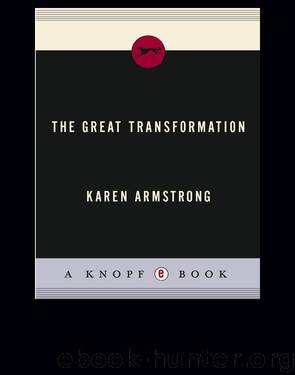The Great Transformation by Karen Armstrong

Author:Karen Armstrong
Language: eng
Format: mobi
ISBN: 9780307264701
Publisher: Knopf Doubleday Publishing Group
Published: 0101-01-01T00:00:00+00:00
A spiritual vacuum had also opened up in India, and new sages worked energetically, even desperately, to find a fresh solution. By the late fifth century, the doctrine of karma, which had been controversial at the time of Yajnavalkya, was now universally accepted.101 Men and women believed that they were all caught up in the endless cycle of death and rebirth; their desires impelled them to act, and the quality of their actions would determine their state in the next life. Bad karma would mean that they could be reborn as slaves, animals, or plants. Good karma would ensure their rebirth as kings or gods. But this was not a happy ending: even gods would exhaust this beneficial karma, would die and be reborn in a less exalted state on earth. As this new concept took hold, the mood of India changed and many became depressed. They felt doomed to one transient life after another. Not even good karma could save them. When they looked around their community, they could see only pain and suffering. Even wealth and material pleasure was overshadowed by the grim reality of impending old age and mortality. In fact, they believed, worldly goods “sap . . . the energy of all the senses,” and hastened their decline.102 As this gloom intensified, people struggled to find a way out.
More and more people became disenchanted with the old Vedic rituals, which could not provide a solution to this problem. The best they could offer was rebirth in the world of the gods, but in the light of the new philosophy, this could only be a temporary release from the relentless recurrence of suffering and death. Further, people were beginning to notice that the rites did not even produce the material benefits they promised. Some rejected the ritual science of the Brahmanas. The Upanishads promised final liberation, but this spirituality was not for everybody. It was based on a close familiarity with the minutiae of Vedic thought that most people simply did not have, and many were doubtful about the identity of the brahman and atman, on which the whole system depended. Yoga offered moksha, but how did the yogin interpret the tranced states that he experienced? Could they be reconciled with Vedic orthodoxy? The Upanishads that were composed at about this time asserted that they could. The Katha Upanishad claimed that the atman (the true self) controlled the body in the same way as a rider managed his chariot. The yogin learned to keep his mind and senses under control like the good horses of a chariot driver. In this way, a person who “has understanding is mindful and always pure,” and would achieve release from the endless cycle of rebirth.103 But others were convinced that yoga was not enough. Something more was needed.
Yoga was a full-time job. It demanded hours of effort each day, and was clearly incompatible with the duties of a householder. By the sixth century, most people thought that the householder had no
Download
This site does not store any files on its server. We only index and link to content provided by other sites. Please contact the content providers to delete copyright contents if any and email us, we'll remove relevant links or contents immediately.
The Lost Art of Listening by Michael P. Nichols(7487)
Why I Am Not A Calvinist by Dr. Peter S. Ruckman(4144)
The Rosicrucians by Christopher McIntosh(3508)
Wicca: a guide for the solitary practitioner by Scott Cunningham(3163)
Signature in the Cell: DNA and the Evidence for Intelligent Design by Stephen C. Meyer(3124)
Real Sex by Lauren F. Winner(3006)
The Holy Spirit by Billy Graham(2942)
To Light a Sacred Flame by Silver RavenWolf(2813)
The End of Faith by Sam Harris(2729)
The Gnostic Gospels by Pagels Elaine(2522)
Waking Up by Sam Harris(2453)
Nine Parts of Desire by Geraldine Brooks(2355)
Jesus by Paul Johnson(2351)
Devil, The by Almond Philip C(2324)
The God delusion by Richard Dawkins(2296)
Heavens on Earth by Michael Shermer(2277)
Kundalini by Gopi Krishna(2179)
Chosen by God by R. C. Sproul(2159)
The Nature of Consciousness by Rupert Spira(2094)
